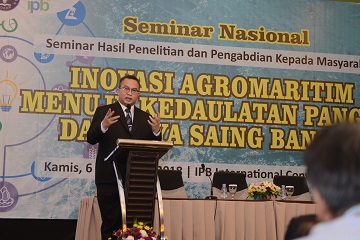LPPM IPB Conducts Seminar about Results of Researches and Community Services

Several technology innovations have been produced by Bogor Agricultural University (IPB). There are six focuses of research in IPB, which are food, energy, natural resources, biology and health, socio-economy and culture, and technology and engineering.
“Several innovations have been made each year in those six fields, including basic and applied technology, as well as social engineering model to accelerate technology innovation dissemination process in society,” said IPB Rector, Dr. Arif Satria when he opened the National Seminar of Research and Community Service Results in IPB International Convention Center (IICC), Baranangsiang campus, Bogor (6/12). This seminar adopted the theme “Agromaritime Innovations Towards Food Independence and Nation’s Competitiveness”.
Issues about food security and independence is important in the current world, in line with the fast growth of population. Food security and independence are key factors for many economic activities in the world. Development of technology and innovation in agriculture sector for certain will create opportunities and improvement in agriculture productivity to achieve food independence. Food security and independence can be a serious threat if the agriculture is neglected.
“Higher education institutions, including IPB, as one of the sources for innovation is expected to keep thinking about how to respond to changes in national and global scale, and can produce the best answers. The purpose is, of course, to solve many food issues, to increase the nation’s competitiveness, to prevent and reduce damage in natural resources and environment, to solve the inequality of region development, and to increase the welfare of agromaritime workers. For that reason, universities have to conduct the researches according to plan that can be integrated from upstream to downstream and can produce technology innovation that can be utilized by the people, industries, and government,” he said.
Expert staff of National Competitiveness Development, Ministry of Economy Coordinator of Republic of Indonesia, Ir. Lestari Indah, M.M during her keynote speech told that productivity in agriculture sector is still lower compared to other sectors. The low productivity in this sector is because the domination of subsistent farmers in Indonesia’s agriculture. The system has to be pushed into a market oriented farming. The method is to increase the capacity of farmers and their expertise of agriculture technology.
She added that to drive agromaritime sector that is market oriented and increase its productivity, there have to be quality human resources. However, human resources in agriculture now is struck by regeneration problem.
“Young generations are usually not interested to become farmers, because they see their predecessors that cannot live in prosperity by being a farmer. Indonesia has to improve its human resource quality. The need of quality human resource, driven by the development of trend related to human resource in Industrial Era 4.0 has to be addressed by educational institutions, especially in agromaritime sector. Digital technology, which is the current trend, enables people to work anywhere, in urban or rural areas, or in coastal areas, where agromaritime potency lies,” she said.
Responding to the issue, revitalization of educational institutions have to be done holistically, from elementary school until higher education. One of the methods is to encourage policies about vocational school development to conduct education revitalization and vocational training in Indonesia, which is the Sekolah Menengah Kejuruan (SMK) and Polytechnic.
“I hope higher education institutions like IPB can get involved and help the vocational development through collaboration with SMK and Polytechnic, so the quality of education can be improved, especially in agromaritime sector. By revitalizing education, especially in agromaritime sector, not only we can improve the human resource quality, but we can also achieve food independence and high nation’s competitiveness,” she said.
During that seminar a signing of Memorandum of Understanding (MoU) was also conducted between IPB and Governments of Malang and Purbalingga Regencies as a form of commitment of regional government in utilizing innovation produced by higher education institutions.
During that opportunity also, Head of Institute of Research and Community Service (LPPM) IPB, Dr. Aji Hermawan expressed his message to all the participants, especially to IPB academicians to maintain their enthusiasm in preparing quality researches and community services that can be useful for Indonesian people.
The Expert Staff of National Competitiveness Development, Ministry of Coordinator in Economy of Republic Indonesia, alongside IPB Rector and seminar participants observed the gallery that showcased several IPB innovations, including Sistem Observasi Kelautan, Wedlyn, Inovasi Clarias, Sekolah Peternakan Rakyat (SPR). Rumpon Portable, and Saung Iklim. This seminar was attended by 458 presenters, consists of 234 oral presenters, 211 poster presenters, and 13 oral presenters from outside IPB. (Ard)


